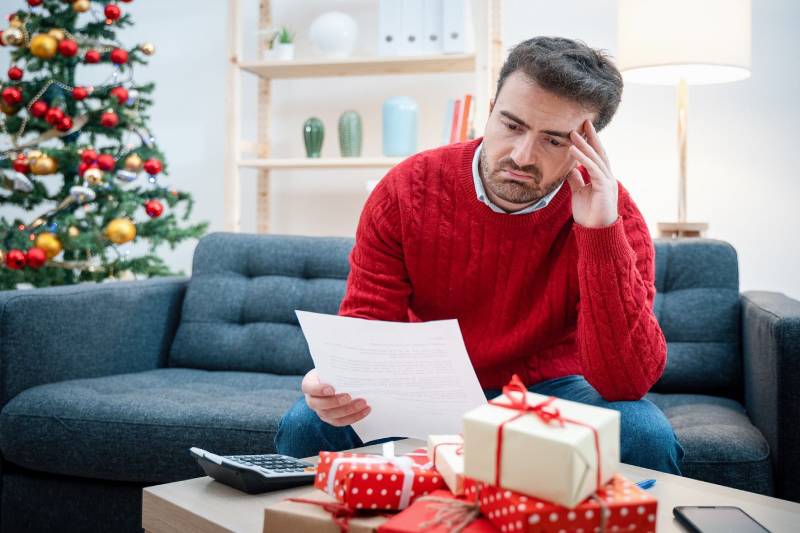You may be feeling the pressures of this time of year already, since the holidays are quickly approaching. Apart from the extravagant feasts, thoughtful presents, and unwavering smiles, there’s also the worry. Holiday celebrations often cause a spike in stress and anxiety symptoms.
If you’re not feeling joyful and cheery, you’re not by yourself. It may seem inevitable that you will struggle to get through the season if this time of year causes you to feel more stressed. I’ve put up useful advice and techniques to assist you reduce your stress throughout the holidays. You can put them to use right now.
What impact do holidays have on mental health?
The holidays are sometimes the most challenging time of year for many individuals mentally.
In a survey , 41 percent of respondents said that the holidays made them more stressed.
Over the holidays, we have a lot expected of us, which can lead to a sharp increase in worry. However, it goes beyond tension and social anxiety. Holiday depression is also a typical occurrence. Some may experience loneliness or a lack of fulfillment as a result, which exacerbates feelings of depression; this is particularly true for those who are mourning around the holidays or who already have seasonal affective disorder.
With the additional strain of family and holiday shopping, or the social isolation that COVID-19 brought to some people’s holidays, conditions like depression and anxiety might deteriorate.
Six suggestions for handling stress this holiday season
Be aware of your emotions
You won’t necessarily be joyful just because it’s the Christmas season. That’s alright, too. Recognizing your feelings is the first step towards handling stress. You may choose how to respond to stress after you identify it and give it a name.
Finding the source of your stress may also be aided by acknowledging the stress you are experiencing. Perhaps it’s the stress of having your entire family in your house, or perhaps your plans are falling apart.
Putting a name to your emotions and figuring out what triggers your anxiety attacks will help you take control of the situation.
When possible, make advance plans
The amount of preparation and coordination that goes into the holidays is one of their most stressful aspects. One of the most important tools you have to lessen holiday stress is preparation.
Some problems can be resolved before they happen by giving yourself the time and space to see possible challenges and make plans for how to handle them. Plan as much as you can, including your travel itinerary, your holiday spending budget, and your meal plan. Make as many plans as you can to reduce and prepare for stress.
Accept saying no
Setting limits is crucial for maintaining our emotional well-being. During the holidays, when we’re not on a schedule and stress levels are higher, they’re even more crucial. Saying “yes” to requests from family members is particularly effortless.
On the other hand, you should politely decline to partake in a custom or activity if you choose not to. Not only can saying no and honoring your boundaries reduce stress, but they can also preserve good relationships and safeguard your morals. You may prevent yourself from overextending yourself and experiencing holiday fatigue by having the confidence to say no.
Give yourself some time
Sometimes it can feel a little oppressive to spend days on end with your entire family crammed into one place. It makes sense that you might be a little anxious. Never forget that you can take some time for yourself no matter how far you or your family have to travel. You have about an hour to dedicate to taking care of yourself.
For each person, self-care looks different. While most hobbies allow you to be by yourself and take a break, there is no right or wrong method to take care of yourself.
Typical holiday self-care techniques:
- Take a walk.
- Meditation or breathing techniques
- Have a bubble bath.
- Regular exercise.
- Go through a book.
- Play some music.
Maintain your healthy routines
Among the busiest times of the year are the holidays. There is a lot going on, and occasionally we neglect our regular routines and habits. We remain home and watch a movie instead of working out. We seek for the holiday delicacies that are all around us rather than eating a nutritious snack.
That in and of itself isn’t a terrible thing. Having a few cookies and not going to the gym won’t end your path toward wellness. But it can make you feel more stressed. Diets heavy in sugar or processed meals have been associated with elevated cortisol levels. The main hormone that controls our stress response is cortisol. You will experience stress if your body has an overabundance of cortisol.
Make sure to prioritize your regular healthy diet and exercise routines whenever you feel overwhelmed. Avoid adding extra stress to your life over the holidays by setting unattainable objectives or expectations for yourself. Locate the ideal middle ground for you.
Speak with your loved ones and friends
The holidays may also be very isolating, particularly if you are unable to see family or don’t have any. Factors such as seasonal affective disorder, social isolation, and family pressures can exacerbate symptoms of depression.
It’s crucial to reach out to people when you need a connection if you’re prone to depressive symptoms. Being deliberate about your need for connection can help you get through the Christmas season, whether it takes the form of regular phone conversations or Zoom meetings.

 Diabetology2 weeks ago
Diabetology2 weeks ago
 Diabetology7 days ago
Diabetology7 days ago
 Diabetology7 days ago
Diabetology7 days ago
 Diabetology4 days ago
Diabetology4 days ago
 Diabetology15 hours ago
Diabetology15 hours ago













